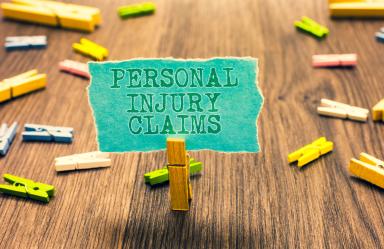Alabama Personal Injury Laws

Alabama is known for its vibrant and scenic communities. From its Gulf Coast beaches to historic sites, the Heart of Dixie delivers a unique flavor of Southern hospitality. While the state offers charm and relaxation, unfortunate accidents can occur. Motor vehicle accidents, falls, and poisonings are some of the many incidents that may cause an Alabaman to seek legal recourse. Around 373,000 cases were filed before municipal courts in Alabama in 2021. During the same year, legal practitioners petitioned over 900 cases to the state’s Supreme Court.
This article provides information on your legal rights involving a range of matters, from product liability to medical malpractice. It also guides you through the state’s time limit for filing claims and its caps on certain damages. Another thing that this article provides are legal resources that help you recover the compensation you deserve.
Alabama Product Liability Laws
Alabama allows plaintiffs to bring a lawsuit involving a defective product against defendants. In such cases, individuals can cite various features of the item as part of their legal action against its manufacturers. These include the product's faulty design, formula, construction, assembly, or label.
One thing that plaintiffs must be aware of is that state law does not allow lawsuits against product dealers, distributors, retailers, or wholesalers. Some conditions have to be met first. Essentially, plaintiffs who are affected may not pursue claims against these intermediaries, if they have limited or no control over how the product works. Through these, Alabama seeks to protect those who are nothing but go-betweens between manufacturers and consumers.
Retailers, dealers, and distributors are not entirely off the hook, though. Companies that largely change a product’s labeling, packaging, or design can face lawsuits. Product users who, despite their best efforts, cannot identify the manufacturer may file suit against the item’s intermediaries.
According to the National Safety Council, Alabama recorded 27.7 poisoning-related deaths per 100,000 residents in 2021. Poisoning ranks as the top cause of preventable injury-related fatalities in the state. One of the reasons it ranks so high is because of drug overdoses, particularly from opioids.
Individuals adversely affected by poisoning-related injuries may report at-fault manufacturers to various organizations. For cases involving defective pharmaceutical drugs, one should contact the Alabama Board of Pharmacy. On the other hand, Alabamans can e-mail the Office of the Attorney General of Alabama to report faulty products like cars.
Medical Malpractice Laws in Alabama
Based on federal data, septicemia is the most over-indexed cause of death in Alabama. Cases of the disease, also known as blood poisoning, are higher in the Yellowhammer State than in most of the country.
The high rate of septicemia is a severe problem. In certain cases, the disease may worsen because of medical malpractice. A healthcare practitioner might perform various actions that constitute malpractice. These include prescribing the wrong medications or forgetting to turn patients in bed.
Plaintiffs seeking damages must obtain expert testimony to prove the healthcare provider’s liability. State law uses the phrase “similarly situated” to determine whether a medical practitioner can be used as a witness. In other words, if a specialist caused the injury, the victims' families should present another specialist.
Applying this principle is not as easy as it looks. One example is the Dempsey v. Phelps case. It involves a board-certified orthopedic surgeon who performed clubfoot surgery on a child. The child’s parents filed a claim against the surgeon, alleging negligence in treating the foot’s vascular and circulatory problems after surgery. To support their case, the parents brought a board-certified cardiovascular surgeon as an expert witness. The court allowed the cardiovascular specialist to testify since the issue involved vascular matters.
Victims or their families may, through the Alabama Medical Liability Act, file a personal injury claim against at-fault parties, which may be physicians, nurses, and hospitals. Part of the claim should include a factual description of the malpractice and, if possible, the place, date, and time of the incident. Affected individuals may file a complaint against the liable party before the Alabama Board of Medical Examiners.
Alabama Guest Passenger Laws
In motor vehicle accidents, drivers cannot be held liable by their non-paying passengers, according to state law. To claim compensation from the vehicle operator or owner, plaintiffs must demonstrate that the accident was caused by wanton or willful behavior.
One of these forms of misconduct is driving while drunk. Fatalities caused by drunk driving in Alabama reached 281 in 2021. The number represents a 21% increase from 233 in 2020.
There are two main reasons why the statute exists.
1. To protect the liability of drivers who offer rides to guests. These vehicle operators may find themselves in legal proceedings due to an unfortunate accident. Through the statute's passage in 1935, the Alabama Legislature sought to maintain fairness for drivers.
2. To prevent plaintiffs from filing unlawful and coordinated lawsuits against insurance companies.
The statute generally applies to guests, as they do not pay drivers. However, a guest becomes a passenger when they enter a situation where both they and the driver benefit. In such cases, those who used vehicles owned by taxi companies or affiliated with ridesharing operations may file a claim against the liable driver.
In Hurst v. Sneed, the Supreme Court of Alabama ruled that the plaintiff was a passenger. They can thereby recover damages. Given that both the plaintiff and the defendant anticipated a mutual benefit, the former, therefore, may press for damages.
Claims for Minors
The guest passenger statute does not generally apply to children under the age of 14.
Negligent Entrustment Claims
The guest passenger statute does not apply to negligent entrustment claims.
Additionally, if the passenger paid for gas, then the guest passenger statue may not apply.
Emotional Distress Laws in Alabama
Emotional distress and mental anguish are commonly claimed damages in the state of Alabama, along with physical pain and company.
The state allows plaintiffs to recover damages for their emotional distress. The road to obtaining these damages can be complex, though. We recommend hiring an experienced personal injury attorney if you feel you have a claim for emotional distress.
Keep in mind, emotional distress laws do not apply if the plaintiff's property is accidentally damaged. State law allows property owners to sue at-fault parties if they committed the accident to show contempt, however.
Zone of danger claims
Zone of danger claims can be made in Alabama when the plaintiff
Was involved in a near-miss incident and did not sustain physical injuries;
Witnessed a family member who was physically injured, and
The mental anguish is the result of the near-miss incident
I'm working on a case where a one-year-old little boy was attacked by two dogs. His older siblings were in the immediate area and broke up the attack by chasing the dogs away. The youngest child has a claim for emotional distress because he is terrified of dogs now. However, the older children also have zone of danger claims due to their experience.
Alabama Open and Obvious Laws
Falls represent the third most common cause of preventable deaths in Alabama, based on National Safety Council data. Defendants facing lawsuits for fall-related injuries can use the "open and obvious" defense to overturn the plaintiff’s claim. Like its name implies, the defense establishes that victims cannot sue for accidents caused by easily visible hazards.
However, the open and obvious doctrine does not apply in cases where an individual is hurt by a hazard that violates federal, state, or municipal law. Plaintiffs, therefore, may need to assess specific regulations relevant to their case.
Unlike neighboring states, Alabama does not have a mandatory statewide building code. As such, some municipalities adopted — with some modifications — the International Building Code.
One example is the state’s most populous city, Huntsville. It prohibits fuel-fired appliances in spaces like storage closets, bathrooms, and surgical rooms. There are exceptions, though. One of these is the use of direct-vent appliances. These are allowed as long as the combustion air comes from the outdoors.
Dram Shop Laws in Alabama
Before 2023, plaintiffs hurt in drunk driving-related accidents may file claims against bars or restaurants that served alcohol to at-fault individuals. However, the passage of a recent act added new conditions to Alabama’s dram shop laws. Some of these conditions include:
The individual must be visibly intoxicated.
The server gave alcoholic beverages to the said individual despite the latter being obviously drunk.
The evidence that the individual was visibly intoxicated should be based on direct evidence. It could also be founded on circumstantial evidence, as long as it is not speculative.
The additional regulations help liquor retailers decrease the value of their liability insurance policies. Because of these new laws, the Insurance Services Office revised Alabama’s grade from 10 to 5. The score means that Alabama is no longer a state where bars or restaurants are highly likely to face a liquor liability lawsuit.
In cases where bars serve alcohol to minors, their parents or legal guardians may file lawsuits. This legal action against dram shops is valid if they provided alcoholic beverages to the minor despite knowing their underage status.
Alabama Business Liability Insurance Requirements
Besides workers’ compensation insurance, Alabama requires businesses to obtain commercial auto insurance. The policy should cover, at a minimum:
$25,000 for the injury or death of a person.
$50,000 maximum for the death or injury of victims in an accident.
$25,000 for property damage.
However, the limit is higher for trucking companies. These businesses must adhere to the minimum requirements provided by the Federal Motor Carrier Safety Administration. Such rules apply in cases where drivers transport items to nearby states. These requirements are:
$300,000 for trucks with a weight of less than 10,001 pounds.
$750,000 for trucks that weigh over 10,001 pounds and move non-hazardous goods or materials.
$1,000,000 for trucks that transport oil.
$5,000,000 for trucks that move hopper-type vehicles and portable tanks. The limit also applies to vehicles transporting class 7 materials, like uranium.
Although general liability insurance is not mandatory in Alabama, some municipalities in the state require similar policies. For instance, contractors in Huntsville have to obtain manufacturer's and contractor's liability insurance policies. This policy should cover, at a minimum, $100,000 for the bodily injury of one person.
In Birmingham, on the other hand, businesses in charge of moving or demolishing buildings must possess liability insurance of at least $100,000 for the death or injury of one person.
Is Alabama a No-Fault State?
No. Alabama follows the at-fault system. Plaintiffs injured because of the defendant's negligence may pursue a legal claim. Similar to other states, accident victims can file lawsuits against at-fault parties to receive compensation for medical expenses.
Plaintiffs may also seek damages from their insurance company. Individuals with uninsured motorist coverage policies may work with their insurer to cover various costs. These include repair bills and medical expenses.
Residents and tourists should know that Alabama ranks 7th on the list of states with the most uninsured motorists. Almost 20% of all drivers in the state do not possess auto insurance, according to the Insurance Information Institute.
Is Alabama a Pure Contributory Negligence State?
Yes. Alabama joins North Carolina, Virginia, and Maryland in adhering to a pure contributory negligence system. Plaintiffs in these jurisdictions cannot recover damages from defendants, even if they are only 1% responsible for an accident. Those seeking not to compensate victims have the burden of proving the latter contributed to their injuries.
Exceptions to pure contributory negligence in Alabama
Plaintiffs under the age of seven and individuals with mental disabilities are not considered negligent.
Those under 14 cannot be contributorily negligent.
Cases that involve wanton behavior. In other words, plaintiffs, even when they are partially at fault, may obtain damages from defendants if they consciously disregarded the former’s safety. For example, racing, drunk driving, and perhaps even texting and driving could be examples of a conscious disregard of safety.
How Much Can Someone Sue For an Injury in Alabama?
Generally, the state does not have caps on the economic and non-economic damages a plaintiff may receive from defendants.
However, there are limits on the amount of recoverable punitive damages. Courts impose punitive awards for plaintiffs to punish defendants for intentional or grossly negligent behavior. Alabamans can acquire either $500,000 or three times their compensatory damages, whichever is greater, as part of their punitive damages award.
There are no caps present for obtainable damages in cases involving wrongful death. Previously, the limit for these cases, where an individual passed away because of medical malpractice, was $400,000. The cap has since been removed, with the Alabama Supreme Court calling it unconstitutional in a 1995 case.
The Statute of Limitations in Alabama
Similar to neighboring states Florida and Georgia, Alabama provides two years for plaintiffs seeking personal injury damages from defendants. The two-year window begins on the day of the accident. Another situation where the timeline applies is in cases involving wrongful death. However, the victim’s family members or estate representatives have to file a claim against liable parties from the date of the victim’s passing.
There are some situations where the two-year window does not apply immediately. For example, in cases where the victim is under 19 or declared insane, the plaintiff may press legal action against at-fault parties within two years, when they turn 19, or once the disability ends.
Legal Resources for Injured Folks in Alabama
Alabama Department of Transportation
The department uses local, state, and federal funds to build and maintain transportation options across the state. It employs at least 4,000 people who manage engineering, safety, and environmental programs. One of its initiatives is the Alabama Service Assistance Patrol. Its team patrols interstate roads daily. It also responds to traffic incidents, manages zones, and assists motorists. Another initiative that the department oversees is the Walk to School Day program. It aims to teach teachers, parents, and their kids safe walking practices. Accidents occasionally occur that are the department's fault. In such cases, Alabamans may file a claim for damages through forms uploaded on the agency’s website.
Alabama State Bar
Since the association’s incorporation in 1879, it has been protecting Alabamans by regulating legal practitioners and ensuring their adherence to ethical standards. It also maintains publications that educate attorneys and non-practitioners about legal topics. In addition, the association runs the Office of the General Counsel, which reviews and prosecutes claims of lawyer misconduct through its Disciplinary Division. Individuals harmed by attorneys unauthorized to practice law can submit a complaint online. Another thing that the state bar handles is the Lawyer Referral Service. The program helps Alabamans seeking legal assistance. Members of the referral service maintain good standing with the state bar and possess professional liability insurance.
Alabama Law Enforcement Agency
The agency represents the consolidated efforts of multiple state organizations, like the Alcoholic Beverage Control Board Enforcement Division and the Department of Public Safety. It provides a range of services to individuals and businesses, from boat registration renewal to background checks. It also allows Alabamans to access their marine accident reports. Individuals can send a written request to the Alabama Marine Patrol with details on the agency’s website. In addition, motorists seeking their crash reports may purchase them online. Those looking to educate themselves on the state’s regulations regarding car, motorcycle, boat, and truck use can find manuals on the website as well.
Expertise.com StaffAuthor
Step into the world of Expertise.com, your go-to hub for credible insights. We don't take accuracy lightly around here. Our squad of expert reviewers, each a maestro in their field, has given the green light to every single article you'll find. From rigorous fact-checking to meticulous evaluations of service providers, we've got it all covered. So feel free to dive in and explore. The information you'll uncover has been stamped with the seal of approval by our top-notch experts.

Hunter GarnettReviewer
Hunter Garnett is an experienced personal injury attorney in Alabama. He grew up on a farm as the oldest of seven children and learned the importance of hard work and helping others at an early age. He prides himself in his ability to assist folks recovering compensation for a wide variety of cases in AL. Visit: https://huntsvilleinjurylawyers.com/




